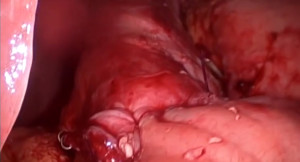Revisional Surgery
- Band Removal
- Band to Sleeve Gastrectomy
- Band to Mini Gastric Bypass
- Band to Roux-en Y Gastric Bypass
Laparoscopy or Minimally Invasive Bariatric Weight-Loss Surgery
Laparoscopic procedures for weight loss surgery employ the same principles as their “open” counterparts and produce similar excess weight loss. Not all patients are candidates for this approach, just as all bariatric surgeons are not trained in the advanced techniques required to perform this less invasive method.
The International Federation for the Surgery of Obesity (IFSO) and its Australian chapter (OSSANZ) recommend that laparoscopic weight loss surgery should only be performed by surgeons who are experienced in both laparoscopic and open bariatric procedures.
Dr. Braun is an experienced revisional bariatric surgeon and has performed a large number of such operations.
In this section we will discuss the special concerns one must think of when there is a consideration of having a revision of a bariatric surgery and our philosophy regarding these issues.
Although bariatric surgery is usually quite effective, at times, it does not work as well as one would like. In such instances, a surgical revision may be considered. When contemplating another bariatric operation, we must decide if a revision will work and what the risks of such a procedure will be. There are several factors that help us make this decision:
- When the initial operation was performed.
- Where the initial operation was performed.
- At what stage the surgeon was in his / her career at the time of the operation.
- What postoperative instructions were given after the initial surgery.
- Initial weight loss history following surgery.
- Any complications that may have occurred following the initial operation.
Now, we will discuss each of these factors individually. The type of bariatric surgery initially performed is very important when considering revision because some types of surgery have been known to fail or have less long-term success. Obtaining an operative report for your surgery is very helpful.
However, if you cannot provide an operative report, we usually know the type of surgery simply by knowing when and where it was performed. Also, because Dr. Braun is familiar with many surgeons currently practicing as well as those who have since retired.
A “learning curve” exists for most operations and bariatric surgery has one of the longest.
Oftentimes, the postoperative instructions given to patients are incorrect or lacking. Therefore, the patient did not know the best way to use their new “tool”. Even though the patient may be out of the “golden period” for rapid weight loss, they usually benefit considerably from proper instruction and can therefore avoid additional surgery.
Weight loss history following the initial surgery tells us if the operation was ever effective or if it “failed the patient” from the very beginning. If postoperative weight loss never occurred or was minimal then it is likely that there was a technical problem with the initial operation.
Likewise, complications occurring after the initial surgery may have led to technical problems that have influenced the durability of the weight loss. Such complications may include intra-abdominal infections, ulcerations, band infections, and prolonged vomiting postoperatively.
Considering bariatric surgery as a “tool” to be used for long-term weight loss, we must determine if the patient has used their “tool” ineffectively or if the patient’s “tool” does not work. If the “tool” has not been used effectively then it is unlikely that a revision would be beneficial. However, if the “tool” is broken or never worked, then a revision may be beneficial.
For example, if the pouch of a gastric bypass was made too large then the patient may lose weight for the first year but eventually lose their sense of satiety or restriction and gain weight.
Usually an upper GI x-ray series will help us determine the pouch size.
If a patient had gastric banding, they may never feel “satisfied” with small meals. Commonly, gastric banding does not give patients the same feedback of satiety that the gastric sleeve or gastric bypass provides. In such cases, a revision to a gastric sleeve (see band to sleeve chapter) or bypass may benefit the patient. However, taking down the scar around the band can be quite technically difficult.
If a patient had a vertical banded gastroplasty (VBG)/ stomach stapling, they may have initially lost weight only to lose their feeling of restriction and regain the weight. Several technical failures arise with this type of surgery over time. It is appropriate to consider revision to a gastric sleeve or bypass if one of these failures has occurred.
If a patient had a sleeve gastrectomy. Failures become increasingly common
- Failure of LSG can be defined as inability to achieve what it meant to do, i.e. weight loss
- It can also be related to diminished QOL or unresolved comorbidities, e.g.
- Intractable GORD
- Persistent diabetes requiring insulin therapy
- Dysphagia
- It can be hampered by complications leading to poorer outcomes and/or further surgery
As there is no standardized consensus as to the most suitable technique following failed sleeve gastrectomy suggestions are:
1.If failure is because patients did not improve their eating habits:
- Counselling
- More frequent visits with members of your team
2. If the sleeve worked well in the beginning, then most likely failure is associated with volumetric problems:
- Consider re-sleeve if clearly definable large parts of the stomach are present on imaging (Ba swallow or FIZZ CT scan)
- Application of a fixed ring or a band to the sleeve might also be an option if further restriction due to fundus enlargement is required
3. Development of severe reflux and/or dysphagia is an indication for conversion to a “low pressure” operation, such as for instance Roux-en-Y gastric bypass or Omega loop gastric bypass
- Unstable T2DM following sleeve, would warrant adding a malabsorbtive operation such as Omega loop gastric bypass or in very severe situations Duodenal Switch.
If a patient had a different previous weight loss operation. Revisional surgery might still be feasible but may represent a significant challenge for all involved, i. e. the surgeon, the team and the patient.
Remember, that revision operations are invariably more technically challenging and carry a higher complication risk. Patients need to seek out specialists bariatric surgeons that perform revision surgeries. Not everyone who regains weight or fails to lose as much weight as they would have liked are candidates for revisional surgery. Because morbid obesity is a multi-factorial disease, a multi-disciplined approach should be utilized to treat patients that have regained or failed to lose weight.
Successful bariatric surgery starts with the operation. Some operations have been done much longer and have been proven to be more durable over time. Gastric bypass surgery is one such operation. Postoperative instruction and support is also very important. Snacking behavior, poor water intake, lack of exercise, and poor supplementation intake can all lead to poor outcomes.
When patients are being evaluated for a revision in our program, a consultation with Dr. Braun is scheduled. At that time all available information is reviewed as well as the operative report, if provided. Dr. Braun then assesses the risks and potential benefits of revision surgery for the patient. Nearly all our program?s operations are now performed laparoscopically and with that in mind,
Dr. Braun will discuss the possibility of performing the revision operation laparoscopically. If surgery is indicated and the potential risks are understood, our program can provide you with an appropriaterevisional bariatric surgery option to help you achieve your goal.
- We need to determine where the issues lay. After fully assessing we are able to best determine the course of action that will help the patient. We have the ability to offer a multi-disciplinary approach to the programmatic variables that can assist the patient in “getting back on track” if that’s what is needed.
- Bands can be revised to gastric sleeve or bypass operations if complications occurred or inadequate weight has been lost.
- Gastric sleeve operations may also need to be in time revised, i.e. to gastric bypass operations, predominantly of Omega loop type.
To gain a better understanding of your personal weight-loss needs, please use our BMI Calculator to determine your current Body Mass Index.
You can learn more about bariatric surgery to understand the specific benefits of each of our weight-loss surgeries.
If you are interested in pursuing any of our laparoscopic procedures, or any other surgical weight-loss solution with the Weight & Metabolic Solutions Australia located in North Brisbane, please complete our registration form and return it to us either by email, post, fax, or simply pop in and meet our friendly staff.
To schedule a surgical consultation with Dr Braun, please contact us or call direct on 07 3353 9694 and on our alternate web page: www.metabolicsurgeryaustralia.com.au

